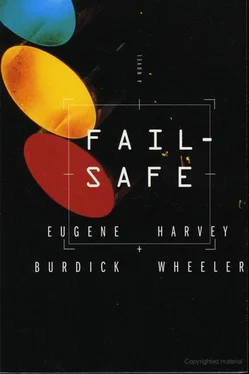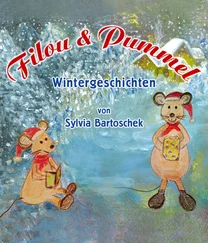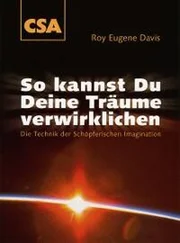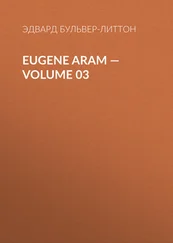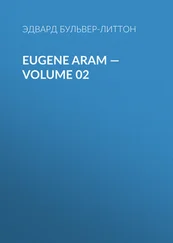“Fire, fire,” a voice said very close to General Bogan. He looked over and saw it was Colonel Cascio. He was half out of his chair, his teeth wet and prominent, his lips drawn back. “Fire before the bastard gets one of those long slow ones off at you.”
“Colonel, if you say one more word like that I will throw you out of this room and have you court-martialed,” General Bogan said in a low voice.
No one else in the War Room had heard the exchange.
Colonel Cascio whirled in his half-bent posture, like a boxer badly hurt and covering. He stared at General Bogan and then his eyes cleared. He sat down.
The Soviet fighter was joined by three other fighters and they formed a long box formation as they ran down their intercept. The Vindicator jinked once more. So did the Soviet fighters. Instantly the Vindicator fired four missiles. The Soviet planes each fired a single missile and continued to speed toward the Vindicator. At the same moment their detection gear told them they were fired upon and the Soviet fighters turned sharply away. It was too late. Five seconds later all of them were destroyed. But their four missiles ran with an agonizing slowness toward the Vindicator. It turned and ran, but was not fast enough. The missiles came in remorselessly. Again there was the merging, again the slow, exploding, engulfing blip.
General Bogan felt his fingertips shaking against his trousers. He felt for a moment as if he were being exposed to some strange torture; some spikeike split of his allegiance; some rupturing of his life. He yearned for the bottle of whisky in a faraway office.
As if by order, the breaths of two-score men were released from their lungs. It made a weird contrapuntal chorus of sighs. Congressman Raskob muttered something to himself. It sounded like “Four more to go.”
The phone on the President’s desk rang. It was a strong unbroken ring. The President looked at Buck, arched his eyebrows, and Buck picked up his phone.
It was Moscow.
The first voice that spoke was that of Khrushchev.
The moment he heard the voice something in Buck’s mind went alert. He heard perfectly and literally what Khrushchev said, but he also sensed something else. It was the same person speaking but in a different voice. The voice ended each sentence with an odd lifting sound.
As Buck translated the literal words he searched back over his experience. Something was there, elusive and subtle, but heavy with meaning.
“We have only a few hours left, Mr. President,” Khrushchev said. “How should we use them? You have launched an offensive attack against our country. Without provocation or cause. You state it is an accident. But meanwhile we lie defenseless before you.”
“Not quite defenseless, Premier Khrushchev,” the President said. “You have hundreds of fighter planes, countless ICBMs, missiles for defense. In fact in your recent Warsaw speech you boasted of the invulnerability of the Soviet forces.”
Krushchev grunted. Then oddly and out of character, he sighed.
Instantly things fell into place in Buck’s mind. He recalled listening to a record at the Monterey Language School made by a Russian peasant in which the ultimate in resignation and despair was precisely this sequence of petulance, a grunt, and a sigh. Even when joined to the most ordinary words their meaning was one of great sorrow-a sorrow so great that no words could convey it. It was not a matter even of inflection. It was a matter of sound and wind and something deep in the chest.
Buck reached for a pad of paper in front of him and in quick bold letters he wrote “Khrushchev’s mood is sorrow.” The President read it upside down as quiddy as Buck wrote it. When he had finished the President drew a large circle around the statement to indicate he understood.
The silence on the line went past the point of tension. The tiny, and usually inaudible, screech of static now seemed to be a scream in their ears. The President started to doodle on the pad in front of him. He traced the head of an arrow, started to draw the shaft and then, very deliberately, lifted his pencil from the pad and held it between his forefingers, the eraser touching the forefinger of his left hand, the sharp point of lead pushed into the flesh of his right forefinger. His hands were steady.
When Khrushchev spoke, it was to Buck like a bell fractured, a flash that ripped darkness, a pinprick through the eardrum. And yet, oddly, his voice was gentle.
“It is ironic, gentlemen, but now, at this moment when we still have time left, the time that is left is empty and without use,” Khrushchev said. Buck’s confidence was strengthened. He was certain that Khrushchev was in a sorrow so deep that it was close to agony. “There is a period during which we can do nothing. After that? I do not know. If the bombs fall on Moscow I know. We will strike back.”
Buck translated quickly, but the President seemed to be listening abstractedly, his head cocked to one side as if he were making a difficult calculation. He nodded at Buck, the calculation made.
“What luck have you had in your attacks on our bombers?” the President asked.
“Luck? No luck at all,” Khrushchev said. “But earned results, yes. By earned results we have gotten 860 of our supersonic fighters vectored in on the hundreds of targets which suddenly appeared on our radar. scope. That, Mr. President, was a tender moment. One group of our experts was convinced that your scientists had developed a method of camouflaging the approach of bombers until they were actually in our territory. They argued that what appeared as decoys were actually real bombers. They urged that we retaliate instantly with all of our ICBMs and our bombers.”
“Why did you not do that?” the President asked. Buck looked at him sharply. The President nodded for him to translate the question. To Buck it seemed brusque and antagonistic.
“Ah, that is a nice question,” Khrushchev said. Buck was bewildered by some inflection, some subtle inclination, so the fugitive meaning. Khrushchev’s words were as ironic and heavy as before, but his delivery was evasive.
“Why did you not launch an offensive?” the President said again.
Buck hesitated. The word “offensive” in Russian can take several different meanings. In one sense it means to question a man’s virility. In another to be crudely egotistical. In another to be a challenge. Buck looked at the President. With the gnawing tension growing within, he knew he must not give the wrong word to Khrushchev. It might be enough to trigger the peasant temper, to bring the powerful fingers stabbing down on the buttons.
Buck made up his mind.
“Why did you not defend yourself by counterattacking?” he translated the President’s words.
Khrushchev said in a quiet voice, “I held back the retaliation because I still had time to take the gamble that you were sincere. Also I knew that it would be the end for both of us. A peasant who becomes a politician, Mr. President, is not without insight. The generals are not happy. Just as I can guess your generals are not happy with you. But there is a time for common sense… which occurs as often among the low as among the mighty.”
The President started to speak and to his own surprise Buck found himself lifting his hand, restraining the President. The Russian was thinking aloud and Buck sensed some gain in not interrupting him. The President nodded.
“Of the 860 planes we sent up 70 were, by great valor and ingenuity, able to attack one or another of your Vindicators,” Khrushchev went on. He paused. “We have been able to destroy only two of your planes.”
“What were your casualties?” the President asked.
“Very high,” Khrushchev said. “Out of the 70 planes which launched attacks somewhere around 65 were destroyed. And by means of which we have no understanding. Most of them simply exploded in midair. And for that we got two of your bombers.”
Читать дальше
